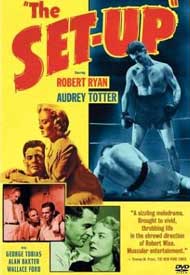Based on Joseph Moncure March's daring 1928 narrative poem The Wild Party, Robert Wise's brilliantly designed & photographed boxing film noir The Set-up (1949) creates a grimy tragic world apart. We're taken onto a neighborhood which is veritably an island for the lower dregs of the fight game -- a finite place in Hell misnomered Paradise City.
I try not to use the word "masterpiece" too often, but this certainly is one. Despite that the events are realistic to the point of horror, there is at the same time an inescapable level of parable, like the history of the universe retold in miniature through the visual beauty of shadow & motion.
 Stoker Thompson (Robert Ryan) has come to a point in his life, in his thirties, where to continue pursuing the dream of championships can only destroy him. His wife Julie (Audrey Totter's finest role) has always supported his dream. Stoker Thompson (Robert Ryan) has come to a point in his life, in his thirties, where to continue pursuing the dream of championships can only destroy him. His wife Julie (Audrey Totter's finest role) has always supported his dream.
With brain-damaged retirees like Bat (Frank Richards) always at hand to remind her how her man could end up, she wants him to quit. But he is not ready to let go of the belief that he is only "one punch away" from success. At this impasse, he feels betrayed by Julie's fear & pragmatic loss of belief in Stoker's never-realized dream.
Tiger Nelson (Hal Baylor, credited as Hal Fieberling) is a young punk boxer backed by the gangster Littleboy (Alan Baxter). He's paid Stoker's trainer & manager Tiny & Red (Percy Nelson & George Tobias) to throw a fight, but his team doesn't believe he could beat the kid no matter what, so they don't bother to tell him they, too, have betrayed his trust in them.
The bloodthirsty audience for the fight includes many distinct personalities. They begin as a bloodthirsty mob & over the course of the film become individuals, an array of gorgeously demonic faces whose idea of a good time is watching two guys almost kill each other.
It's the first night in his career when Stoker's wife isn't seated ringside. His heart is breaking, but his heart is no less that of a fighter who cannot give up. He simply has that feeling he can take the younger man.
Tiger has been told that Stoker will take a dive in the third round, & is startled when things don't go as planned & Tiger gets as good a beating as he gives. Littleboy & his moll have great seats, & the expression on Littleboy's face never changes even as it sinks in that he's been double-crossed.
The film is seventy-two minutes long shot in real time. The first act is the tension between Stoker & his wife, & her wandering the cityscape trying not to think of her husband taking beating after beating until he's too much a headcase to fight again, & Stoker waiting for his match in a dressing room full of foolish dreamers young & old.
Mini-stories unfold in that dressing room, for each man has come to lowly Paradise City still clinging to dreams as foolish as Stoker's. He looks from face to face, listens to one tale & then another, & knows it's too late for any of them. But there's one face he dares not look at too long, & that's his own.
The second act is the fight itself, damned real looking & brutal, again in real time. It's the longest act because we watch the entire fight. Grotesque though the battle becomes, it is the machinations & emotions outside the ring that give the match amazing depth & drama.
The third act regards the repercussions of Stoker having won, that moment of regained glory with his wife absent, his trainer & agent hightailing it for fear of Littleboy, & Stoker lucky if Littleboy with his henchmen don't kill him in an alley. The final irony is that the horror Stoker experiences in that blind alley will be the event that could well save his marriage & whatever is left of his braincells, by destroying once & for all his ability to fight.
copyright © by Paghat the Ratgirl
|

 Stoker Thompson (Robert Ryan) has come to a point in his life, in his thirties, where to continue pursuing the dream of championships can only destroy him. His wife Julie (Audrey Totter's finest role) has always supported his dream.
Stoker Thompson (Robert Ryan) has come to a point in his life, in his thirties, where to continue pursuing the dream of championships can only destroy him. His wife Julie (Audrey Totter's finest role) has always supported his dream.